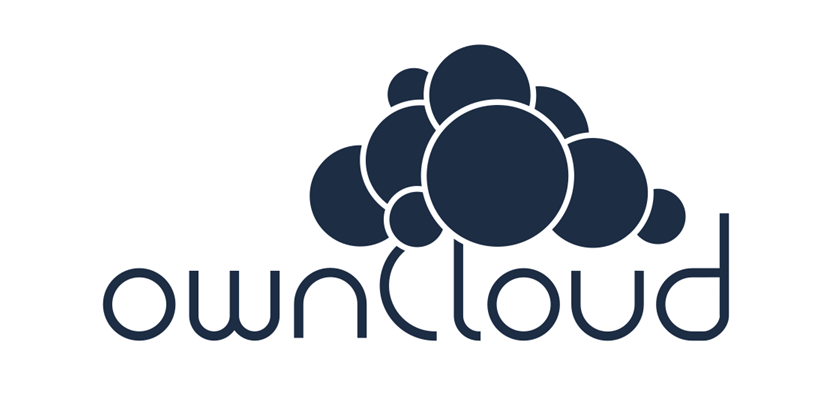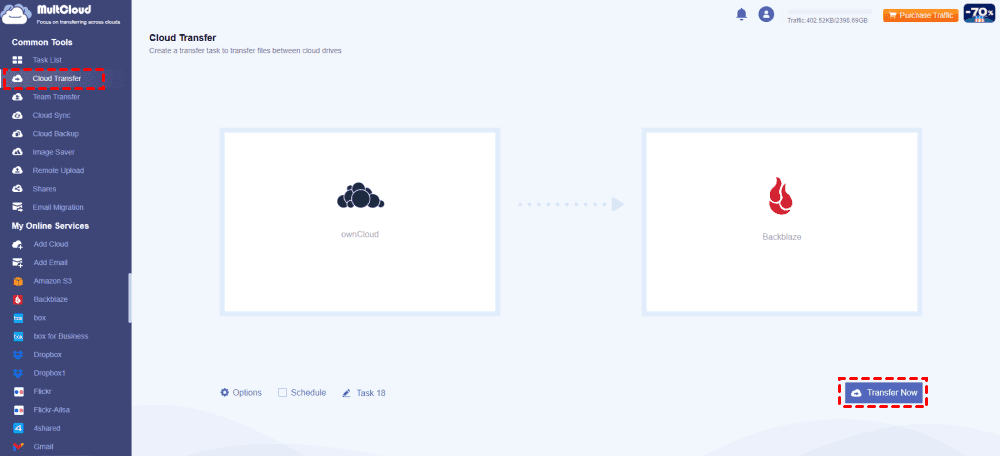Quick Navigation:
Preface
In today's digital landscape, managing data across multiple cloud storage platforms has become increasingly common. Among the popular choices are ownCloud and Backblaze, each offering unique features tailored to different user needs.
If you’re struggling how to choose ownCloud and Backblaze, you’re in the right place to find the differences between ownCloud and Backblaze, and the useful information to help you to choose which one to manage your precious files.
About ownCloud and Backblaze
Starting with ownCloud, this platform empowers users with a robust set of tools to manage and synchronize files across devices. Founded on the principles of open-source software, ownCloud allows organizations to deploy their own private cloud storage infrastructure, maintaining complete control over data privacy and security. Businesses often opt for their ownCloud due to its scalability and the ability to integrate with existing IT infrastructures seamlessly.
In contrast, Backblaze positions itself as a hassle-free backup solution designed for users looking to safeguard their data effortlessly. With unlimited backup storage at competitive rates, Backblaze offers continuous and automatic backups, ensuring that users never lose important files. This makes it an attractive choice for individuals and businesses alike, especially those prioritizing simplicity and reliability in their backup strategy.
If you want to learn about these two clouds precisely, check the following useful chart, we will show you the main differences between ownCloud and Backblaze, including free trial, supported platforms, users, sharing, encryption measures, storage options, versions, file size, pricing, and more.
ownCloud vs. Backblaze, which is Better?
To provide more details about ownCloud and Backblaze, you can check the following table to make a better decision. Check it now:
| Features | ownCloud | Backblaze |
|---|---|---|
| free trial | 14-day | 15-day |
| Platforms | Windows, macOS, Linux, iOS, Android | Windows, macOS, iOS, Android |
| Users | 5+ | 1-unlimited |
| Share with Friends | √ | √ |
| Encryption measures | End-to-end encryption, Multi-Factor Authentication, 256-bit AES and SSL/TLS encryption | AES 128-bit Encryption; Private Encryption Key; Two-Factor Verification |
| Storage Options | 500GB, 1TB | unlimited storage |
| Keep versions | up to 30 days | 30 days or 1 year |
| automatic backups | as soon as possible | as soon as possible |
| File Size Limit | 512MB | - |
| Selective sync | √ | - |
| Integrations | Microsoft Office Online Server, Microsoft 365, Teams, Outlook, and WND | Zapier, NAS, Amazon S3, Google Cloud, etc. |
| Online Storage | ownCloud Online | Backblaze B2 |
| viruses and malware Detection | √ | √ |
| Pricing | $15 /user/month for single users for 500GB; $13 /user/month for Teams (1TB+200GB per user) | computer backup: $9/month/pc $99/year/pc $189/2 years/pc Backblaze B2: $6 /TB/mon (Pay-As-You-Go) $1560 /20TB/Year |
When deciding between ownCloud vs. Backblaze, several factors come into play:
- Features Flexibility: ownCloud provides limited cloud storage for users while Backblaze offers unlimited cloud storage; not like ownCloud, Backblaze also provides computer backup, which is more powerful than ownCloud. ownCloud has file size limit while Backblaze does not.
- Customization and Control: ownCloud excels in offering extensive customization options and control over data, making it ideal for businesses needing tailored solutions. In contrast, Backblaze focuses on simplicity and ease of use, providing a straightforward backup service without the need for extensive configuration.
- Security and Privacy: With ownCloud, users have the advantage of self-hosting their data, which enhances security by keeping sensitive information within their own infrastructure. Backblaze, while secure, relies on its data centers for storage, ensuring robust physical security measures but potentially raising concerns about data control.
- Cost Considerations: While both platforms offer competitive pricing, the cost structure differs significantly. ownCloud's expenses may vary based on self-hosting and customization needs, whereas Backblaze offers predictable pricing with flat-rate, unlimited backup plans that are easy to budget for. Backblaze provides more affordable pricing compared with ownCloud.
So, choose the right cloud storage for yourself according to the above information.
Best Free Cloud Data Migration Service - MultCloud
If you happen to have these two clouds, ownCloud and Backblaze, want to choose a better one due to limited budget or other reasons, what should you do to migrate files between ownCloud and Backblaze? Don’t worry, here comes the powerful web-based multiple cloud storage manager - MultCloud to help.
You can find the following strengths with MultCloud to perform ownCloud Backblaze migration:
- Direct Move. MultCloud is dedicated to migrating files between clouds directly, so there is no need to download from source cloud and upload to the target cloud, saving time and effort.
- Flexible Ways. You have different ways to move files from ownCloud to Backblaze or vice versa, like cloud to cloud sync, backup, transfer, share, copy to, and many more.
- Useful Settings. You can configure useful settings to make the task run smarter, like filter, schedule, email and more.
- Strong Security. With MultCloud, your files and privacy are protected by 256-bit AES encryption, an OAuth authorization system, etc.
- 30+ Clouds Supported. MultCloud supports almost all clouds in the market, including ownCloud, Backblaze, Google Drive, Dropbox, OneDrive, SharePoint Online, 4shared, IDrive e2, Icedrive, pCloud, Wasabi, iCloud Drive, iCloud Photos, WebDAV, FTP/SFTP, NAS, MySQL, and more.
So, how to move files between ownCloud and Backblaze easily with MultCloud? Check in the following part.
How to Transfer Files Between ownCloud and Backblaze
Here we will show you how to move ownCloud to Backblaze with MultCloud for example, let’s find out the simple steps:
1. Create a MultCloud account and log in, it will show you the Dashboard afterwards.
2. Tap Add Cloud > ownCloud, then follow the guide to add. Then use the same way to add Backblaze.
3. Select Cloud Transfer, choose ownCloud files as the source while Backblaze is the target.
4. Hit the Transfer Now button to move files from ownCloud to Backblaze directly.
Tips: Before transferring, you can adjust a few helpful settings in Options and Schedule.
- You may set up the transfer methods, save the file modification date, remove all source files when the transfer is finished, consolidate all transferred files into a single folder, and more with the aid of the Options. In addition, you may organize Email and Filter to make the process easier to do.
- One of the most helpful features is Schedule, which allows you to conduct the backup on daily, weekly, or monthly basis. This allows you to regularly update from ownCloud.
- If you want to enjoy all of these features, please upgrade to unlock them all. Besides, you can also enjoy all other premium features.

- Smart Share: Share cloud files via public, private, or source mode.
- One-key Move: Quick data transfer, sync, and backup among clouds.
- Email Archive: Protect emails to other clouds or local disks.
- Remote upload: Effectively save web files to clouds via URL.
- Save Webpages as PDF/PNG: Keep them locally or online.
- Safe: Full-time 256-bit AES and OAuth authorization protections.
- Easy: Access and manage all clouds in one place with one login.
- Extensive: 30+ clouds and on-premise services are supported.
The End
In conclusion, choosing between ownCloud and Backblaze hinges on your specific needs for data management, customization, and backup reliability. Whether you prioritize control and customization with ownCloud or opt for the simplicity and robust backup solutions of Backblaze, both platforms offer distinct advantages tailored to different user preferences. By understanding these differences and following best practices for data migration, you can effectively leverage the strengths of each platform to enhance your data storage and management strategy.
MultCloud Supports Clouds
-
Google Drive
-
Google Workspace
-
OneDrive
-
OneDrive for Business
-
SharePoint
-
Dropbox
-
Dropbox Business
-
MEGA
-
Google Photos
-
iCloud Photos
-
FTP
-
box
-
box for Business
-
pCloud
-
Baidu
-
Flickr
-
HiDrive
-
Yandex
-
NAS
-
WebDAV
-
MediaFire
-
iCloud Drive
-
WEB.DE
-
Evernote
-
Amazon S3
-
Wasabi
-
ownCloud
-
MySQL
-
Egnyte
-
Putio
-
ADrive
-
SugarSync
-
Backblaze
-
CloudMe
-
MyDrive
-
Cubby



